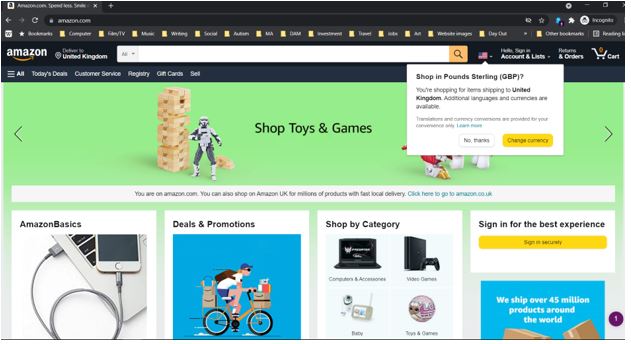IP geolocation is the act of sourcing the physical address of a user who visits your website by doing IP lookups. This can give you valuable information that can help inform the choices you make, as we’ll explore below. It also plays a part in improving user experience and in fraud detection. IP geolocation can also be used to serve a range of needs that are integral to a business model. This is especially true if that model involves delivering geolocation information to customers.
While IP geolocation can be valuable, we need to be clear that it’s rarely 100% accurate. It might hit the right city, but be the wrong neighborhood, for example. It all depends on how up to date is the database of the service you’re using.
What many sites will do when you visit them is use IP geolocation to assess where you are and adapt the website that you’re visiting. Since a picture tells a thousand words, here’s a screenshot from Amazon.

If you look closely, then you’ll see that this is the US Amazon site (Amazon.com) not the UK site (Amazon.co.uk). The site has used IP geolocation to detect that and is offering the user the chance to change the displayed currency to the UK currency (Pounds Sterling).
The benefit of this is that it enables users to shop in their native currency so they can do price comparisons without having to go to a currency converter. Also, people are naturally inclined to think in their native currency.
Note, though, that it hasn’t automatically changed the currency. Instead, it’s giving users the option of changing. A user might want to shop in dollars if they’re American visiting the UK. If they need to buy a present for someone back home, then they’ll need to shop in USD. So, from a user experience perspective, it’s important to make such localization changes optional.
IP geolocation vs VPNs and proxies
However, there’s a counter technology for every technology. Technologies such as VPN, anonymizer or proxy can be used to deliberately create ‘spoof’ locations. So you need to detect such technologies in order to be able to act accordingly.
If you want to avoid situations where you geolocate IP addresses which belong to VPNs and build the customer experience around them, then your best bet is to use an IP geolocation service that checks for VPNs and proxies. You can even block users using them if it better suits your policy.
Examples of IP geolocation
A substantial use case for IP geolocation is targeted marketing. If you have ads on your site that aren’t targeted, then that means that users might see ads for products that they can’t buy. So there are reasons to segment your audience and the ads they see:
- Law: there are laws in place against selling high technology items to certain markets due to the potential for repurposing for illicit means
- Climate: someone who lives in southern California or Texas isn’t likely to get much use from winter gear especially in summer
- Shipping: if the product cannot reasonably be shipped to another country because of its size or weight
So displaying winter gear ads to someone in Texas in June is likely to be met with incredulity, to say the least. This incredulity could even lead to someone not returning to your site because they find your ads ridiculous. Therefore, ads that are targeted are going to provide the greatest value for your customer.
Targeted ads are also going to provide the greatest benefit for your business because the advertising spend is going to be targeted rather than scattergun. As a result, advertising that’s targeted in this way almost always outperforms generic advertising. You can test this performance in practice, though, with A/B testing.
Location data can be sourced based on registered user address if login is required. However, if you use IP geolocation, then you’re going to be able to source your users’ locations automatically and automate the process.
So it’s about getting the right ads in front of the right people at the right time.
IP geolocation can also offer some security measures that you’re going to find helpful. This technology can compare a user’s stated location with their IP address data to see whether the two match. If they don’t, it could well be a fraudulent transaction or interaction that needs to be blocked.
This capability is very important in retail as online retailers are typically going to be responsible for fraud in online transactions and can be hit by chargebacks. So defending against fraud isn’t just good for your customer, it’s vital protection for your business too.
What are the benefits of IP geolocation?
- A richer user experience.
- It is the most accurate way to geolocate website visitors.
- Websites and prices can be localized.
- It can boost ROI (Return on Investment) for your marketing
- It is essential for implementing geographical restrictions to websites.
- It can identify VPNs and proxies in order to block them.
It can defend against fraud and chargebacks.
